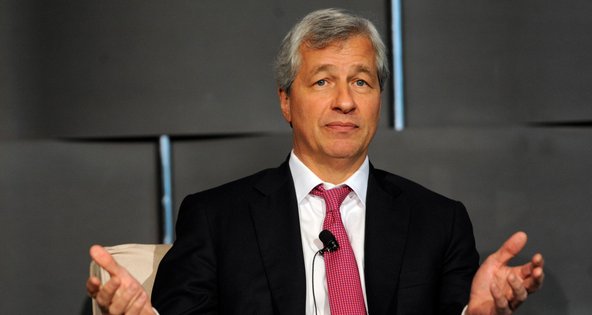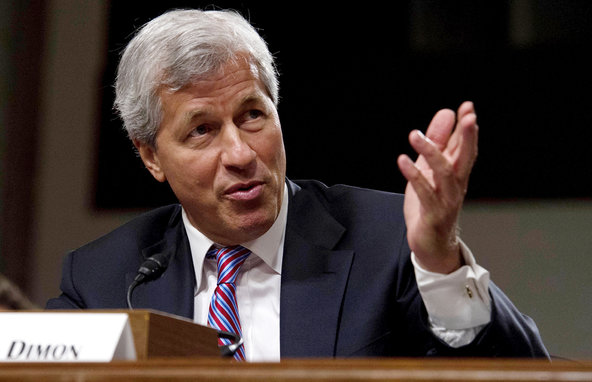 Keith Bedford/ReutersJamie Dimon, chairman and chief executive of JPMorgan Chase.
Keith Bedford/ReutersJamie Dimon, chairman and chief executive of JPMorgan Chase.
As JPMorgan Chase’s annual meeting nears, much of the tension surrounds a critical vote to split the chairman and chief executive roles — a decision that could strip Jamie Dimon, the bank’s influential leader, of the dual titles he has held since 2006. Behind the scenes, though, another battle is brewing.
Some JPMorgan shareholders are taking public aim at individual directors who hold crucial positions on the bank’s audit and risk committees as the bank grapples with an onslaught of regulatory challenges.
On Friday, the CtW Investment Group, which represents union pension funds and owns six million shares in JPMorgan, said it planned to vote against the three directors on the risk policy committee and the head of the audit committee. While it is not known how other shareholders are voting on directors, big stakeholders like BlackRock, T. Rowe Price and TIAA-CREF have increasingly taken aim at boards, voting against directors they think are performing poorly.
JPMorgan, once the darling of Washington after emerging from the financial crisis in far better shape than its rivals, suffered a multibillion-dollar trading loss last year. Since then it has increasingly found itself under regulatory scrutiny for potential risk and compliance lapses.
The Office of the Comptroller of the Currency, one of the bank’s chief regulators, is deciding whether to bring new enforcement actions, according to people who spoke on the condition of anonymity. One action the agency is considering, these people said, focuses on whether JPMorgan used faulty documents in lawsuits to collect overdue credit card debt.
In one of the latest regulatory crackdowns, investigators from the Federal Energy Regulatory Commission sent a scathing message to the bank in March that warned of a potential action over accusations of manipulation in the energy markets. The confidential government document, reviewed by The New York Times, also took aim at a top executive, Blythe Masters, contending she gave “false and misleading statements” under oath.
“We intend to vigorously defend the firm and the employees in this matter,” said Kristin Lemkau, a spokeswoman for the bank, which is the nation’s largest. “We strongly dispute that Blythe Masters or any employee lied or acted inappropriately in this matter.”
While Mr. Dimon apologized in a recent letter to shareholders for disappointing “our regulators,” vowing to bolster controls and “do all the work necessary to complete needed improvements,” some shareholders are not satisfied and are now considering how to cast their votes. Some shareholders are reluctant to vote to split the role of chairman and chief executive, saying the right way to send a message is to vote against certain directors, a move they think will result in positive change at the board level.
JPMorgan’s annual meeting is on May 21 in Tampa, Fla., and the results of shareholders’ votes on all the proposals will be announced then. Directors and senior executives at the firm have been contacting major shareholders in recent weeks, hoping to ease any concerns they might have. They hope to persuade investors not only to back the board but also to vote against a proposal calling for the separation of the chairman and chief executive role. Last year, 40 percent of shareholders supported the proposal.
Shareholders like CtW are singling out members of the risk committee because they think the board failed to police the bank in important areas, contributing to the trading loss in 2012.
“What we have learned over the past year is that the performance of the risk committee is even worse than we thought,” said Richard Clayton, CtW’s research director. “Their behavior is a combination of being out at sea and asleep at the wheel. Both are bad and together they are disastrous.”
James S. Crown, who has been a director of JPMorgan or one of its predecessor companies since 1991, is chairman of the risk policy committee. The other members are David M. Cote, the head of Honeywell International; Timothy P. Flynn, a former KPMG executive; and Ellen V. Futter, president of the American Museum of Natural History. Mr. Flynn was appointed to the risk policy committee in August 2012.
CtW also plans to vote against Laban P. Jackson, chairman of the audit committee, which shares responsibility for oversight.
CtW voted against all four directors last year but went public only about its displeasure with Ms. Futter, contending she lacked banking experience. Last year, 86 percent of shareholders voted for Ms. Futter, the lowest amount of support for any director. A person close to JPMorgan who spoke on the condition of anonymity because he was not authorized to discuss board matters publicly, said that while Ms. Futter was not a career banker, she was well steeped in issues like reputational risk, bringing value to the committee.
Failing to receive a majority of shareholder votes does not necessitate a resignation, but such a vote might prompt a director to leave.
In 2011, before the big trading loss, CtW met with senior bank executives, warning that risk controls needed to be improved. It felt its concerns fell on deaf ears.
At a recent meeting with bank management, including the chief financial officer, Marianne Lake, and the general counsel, Stephen M. Cutler, the company owned up to its recent risk lapses, CtW said, but it has failed to devise any significant changes to improve the risk committee’s operations.
“We realize there was a management failure,” said Dieter Waizenegger, CtW’s executive director. “But it is as if the board didn’t do anything wrong and that is puzzling.”
Ms. Lemkau, the bank spokeswoman, said, “We disagree with CtW on the points they have raised but continue to engage with them.”
CtW’s six million shares are worth about $285 million. In contrast, the company’s biggest shareholders own more than 100 million JPMorgan shares each.
Since the trading loss last year, JPMorgan and its board have worked to fortify controls. JPMorgan’s board reduced Mr. Dimon’s pay this year by more than 50 percent, to $11.5 million, and issued a public report on the trading misstep. With the approval of the board, JPMorgan also clawed back more than $100 million in pay from the employees at the center of the soured wagers.
Last year, the board met 15 times, according to documents filed with the Securities and Exchange Commission. In the bank’s proxy filing, the 11-member board said that Mr. Dimon should continue to hold the duel top posts.
“The board has determined that the most effective leadership model for the firm currently is that Mr. Dimon serves as both,” the filing said.
Article source: http://dealbook.nytimes.com/2013/05/03/jpmorgan-board-feels-heat-from-upset-shareholders/?partner=rss&emc=rss
